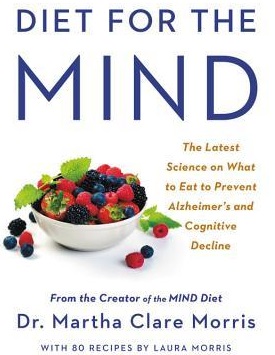Diet for the MIND: The Latest Science on What to Eat to Prevent Alzheimer's and Cognitive Decline
In DIET FOR THE MIND, Dr. Martha Clare Morris says that we can do much to fend-off dementia:
“It is possible to delay the symptoms of dementia in later life by taking control of your health.”
Before spending much time reading this book, I wanted to know WHY I should believe the author—that is, how is she qualified to give advice on this subject? Well, it turns out the author’s credentials are stellar. Dr. Morris is a professor of Epidemiology at Rush University and has a doctorate from Harvard. She has been researching cognitive decline for 20 years.
Here’s the key to the professor’s findings: The same good practices that help your physical health also improve your brain. It comes down to what we eat, and how much we move:
“Diet and physical activity are at the root of nearly all major chronic conditions and diseases. Focusing on these two basic components of daily living is key to aging healthfully.”
Much of the book is dedicated to guidelines for eating. In Chapter 3: “Foods For Everyday Eating,” we are exhorted to eat lots of leafy green vegetables:
“Among all the different types of vegetables out there, the leafy green variety has shown to be among the most important for protecting cognitive abilities. . .”
Here’s something I didn’t know: Go for the DARK-leaved veggies:
“The darker the leaves, the greater the source of brain-healthy nutrients.”
Leafy and Colorful
In Chapter 4: “Foods to Eat Every Week,” I was delighted to find that walnuts take the prize for best nut:
“If you had to pick a winner for brain-enhancing nuts, walnuts would take first prize. . . two to five servings of this brain food per week were associated with 37 percent fewer deaths from coronary heart disease.”
The author not only suggests what we should eat—she says what we should avoid. So, we read in Chapter 5 about “Brainless Foods that Harm the Mind.” The foods here are pretty much what you would expect: fried food, fast food, fatty food, sugary food.
Luckily for me, chocolate is NOT listed as one of the “Brainless Foods.” I was encouraged by the small section on chocolate, entitled, “Is Chocolate A Brain Food?” The author notes that some studies show a link between cocoa and increased blood flow to the brain. (I hope more studies will show that!)
Brain Food, Definitely.
So all in all, I found DIET FOR THE MIND to be a credible book with lots of practical ideas. Dr. Morris writes clearly, making the book easy to read. She also cites lots of research studies to back up her claims. The latter part of the book contains suggestions and recipes for putting into practice the lifestyle and dietary changes recommended by the author.
One interesting observation: The author is currently running a study to confirm how well her recommended diet regimen protects again cognitive decline. It will be interesting to see how well the results of this study support her dietary recommendations.
For further reading on this subject, I also recommend, The Alzheimer's Solution: A Breakthrough Program by Dean Sherzai and Ayesha Sherzai. The physician-authors reach a nearly identical conclusions as in this book.
Diet for the MIND by Martha Clare Morris









